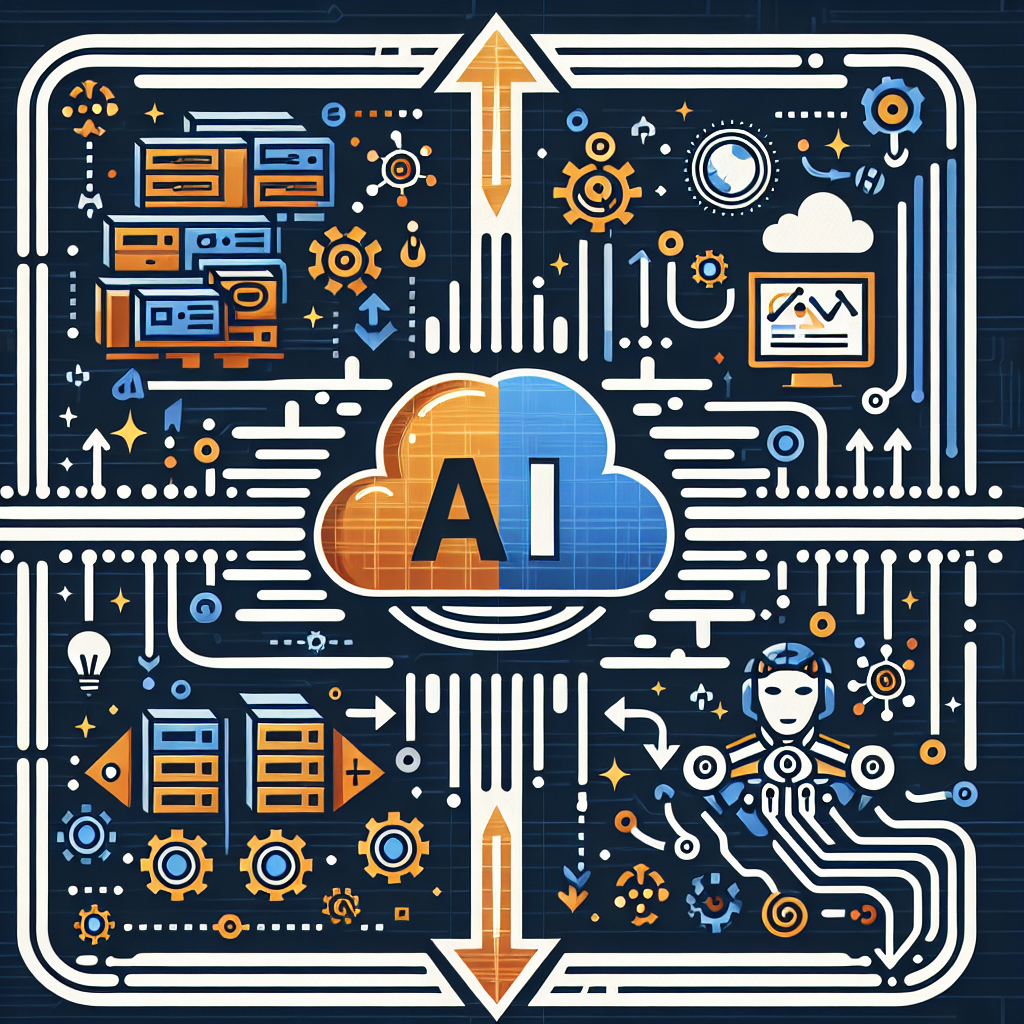In today’s digital age, businesses are increasingly relying on cloud computing to store and manage their data. The cloud offers a scalable and cost-effective solution for businesses of all sizes, allowing them to access their data from anywhere in the world. However, managing a cloud environment can be complex and time-consuming, requiring constant monitoring and optimization to ensure efficient performance.
This is where artificial intelligence (AI) automation comes in. By leveraging AI technology, businesses can enhance the efficiency of their cloud environments, reducing costs, improving performance, and increasing productivity. In this article, we will explore the benefits of using AI automation in the cloud and how it can help businesses achieve their goals.
Benefits of AI Automation in the Cloud
1. Cost Reduction: One of the primary benefits of AI automation in the cloud is cost reduction. AI technology can analyze data and make predictions about future usage patterns, allowing businesses to optimize their cloud resources and avoid unnecessary expenses. By automating tasks such as resource allocation, capacity planning, and workload management, businesses can reduce their cloud costs significantly.
2. Improved Performance: AI automation can also help businesses improve the performance of their cloud environments. By continuously monitoring and optimizing the cloud infrastructure, AI technology can identify potential bottlenecks and inefficiencies, and take corrective actions to ensure optimal performance. This can result in faster response times, higher availability, and better overall user experience.
3. Increased Productivity: By automating routine tasks and processes, AI technology can free up IT resources to focus on more strategic initiatives. This can help businesses increase productivity, accelerate innovation, and drive growth. With AI automation, businesses can streamline their operations, reduce manual errors, and improve overall efficiency.
4. Enhanced Security: Security is a top concern for businesses when it comes to the cloud. AI automation can help businesses enhance the security of their cloud environments by continuously monitoring for threats, detecting anomalies, and responding to security incidents in real-time. By automating security processes, businesses can better protect their data and ensure compliance with regulations.
5. Scalability: AI automation can also help businesses scale their cloud environments more efficiently. By automating tasks such as provisioning, deployment, and scaling, businesses can quickly adjust their resources to meet changing demands. This can help businesses adapt to market fluctuations, handle spikes in traffic, and support growth without compromising performance.
How AI Automation Works in the Cloud
AI automation in the cloud works by using machine learning algorithms to analyze data, make predictions, and take actions to optimize cloud resources. Here are some common use cases of AI automation in the cloud:
1. Predictive Analytics: AI technology can analyze historical data to predict future usage patterns and resource requirements. By forecasting demand, businesses can optimize their cloud resources and avoid over-provisioning or under-provisioning.
2. Automated Resource Allocation: AI automation can dynamically allocate resources based on workload demands, ensuring that applications have the resources they need to perform optimally. This can help businesses maximize resource utilization and reduce costs.
3. Self-Healing Systems: AI automation can detect and respond to system failures or performance issues in real-time. By automatically identifying and resolving issues, businesses can minimize downtime and maintain high availability.
4. Intelligent Workload Management: AI automation can optimize workload placement and scheduling to ensure that applications are running on the most appropriate resources. This can help businesses improve performance, reduce latency, and enhance user experience.
5. Security Incident Response: AI automation can detect security threats, such as malware or suspicious activity, and take immediate action to mitigate the risks. By automating security incident response, businesses can better protect their data and prevent breaches.
FAQs
Q: How does AI automation differ from traditional automation in the cloud?
A: Traditional automation in the cloud typically involves scripting or rule-based approaches to manage tasks and processes. AI automation, on the other hand, uses machine learning algorithms to analyze data, make predictions, and take actions based on insights. This allows AI automation to adapt to changing conditions and optimize cloud resources more effectively.
Q: What are the key considerations for implementing AI automation in the cloud?
A: When implementing AI automation in the cloud, businesses should consider factors such as data quality, model accuracy, scalability, security, and compliance. It’s essential to have a robust data strategy, ensure transparency and accountability in AI models, and address ethical concerns related to AI automation.
Q: How can businesses get started with AI automation in the cloud?
A: Businesses can start by identifying use cases where AI automation can provide the most value, such as resource optimization, performance tuning, or security monitoring. They should then evaluate AI technologies and tools that align with their goals and requirements. It’s also important to involve stakeholders from different departments to ensure a successful implementation.
Q: What are the potential challenges of implementing AI automation in the cloud?
A: Some potential challenges of implementing AI automation in the cloud include data privacy concerns, model bias, lack of expertise, and integration complexity. Businesses need to address these challenges by implementing robust data governance practices, ensuring fairness and transparency in AI models, investing in training programs for employees, and collaborating with partners and vendors.
In conclusion, AI automation in the cloud offers numerous benefits for businesses looking to optimize their cloud environments and achieve greater efficiency. By leveraging AI technology to automate tasks, analyze data, and make predictions, businesses can reduce costs, improve performance, increase productivity, enhance security, and scale more efficiently. With the right strategy and tools in place, businesses can harness the power of AI automation to drive innovation and success in the cloud.

